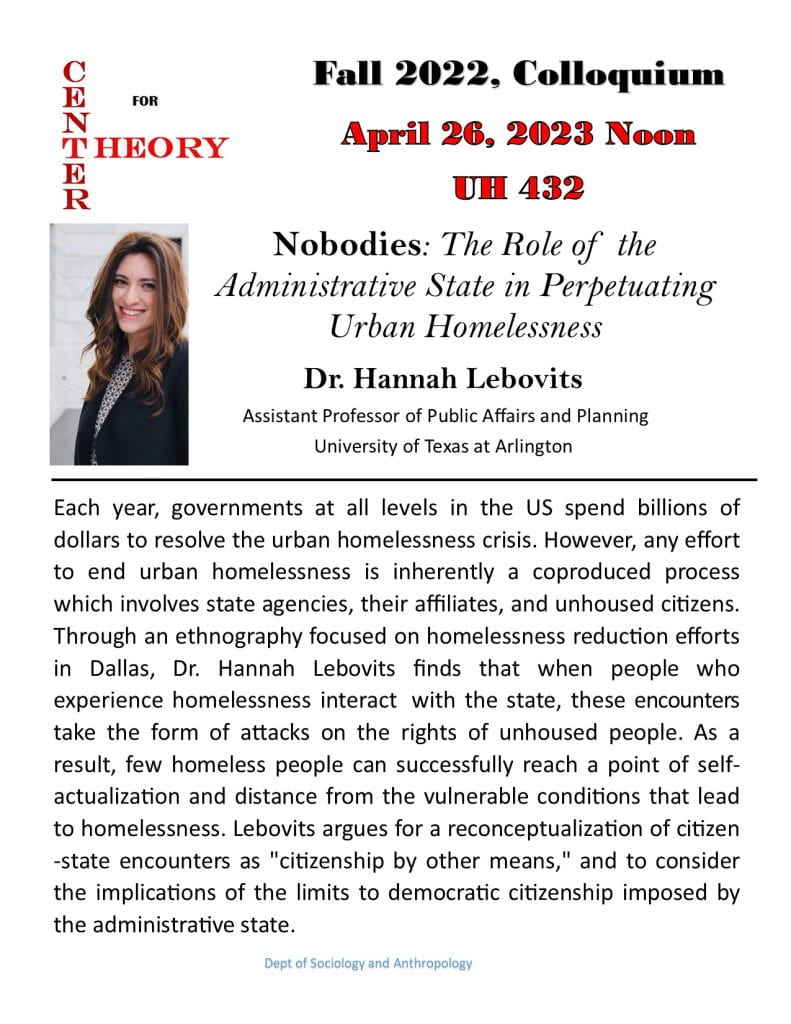Join us for the final colloquium for Spring 2023 on April 26 at Noon in 432 University Hall. Dr. Hannah Lebovits, Assistant Professor of Public Affairs and planning will present “Nobodies: The Role of the Administrative State in Perpetuating Urban Homelessness.”
 Abstract: Now in its fifth decade, the contemporary urban homelessness crisis attracts a tremendous amount of attention from city dwellers, visitors, media pundits, the business community, nonprofit industries and public sector agents. Every year, governments at various levels in the United States spend billions of combined dollars to resolve this crisis with a combination of service provision, punitive measures, and infrastructure efforts. However, any effort to end urban homelessness is inherently a coproduced process which must involve both the state’s agencies and affiliates as well as the unhoused citizen. Through a multi-year ethnographic research endeavor focused on the homelessness reduction efforts of the city of Dallas, Lebovits finds that when unhoused citizens interact with the urban administrative state, these encounters take on the form of attacks on the social citizenship and embodiment rights of unhoused people rather than democratic efforts to promote coproduction with people experiencing homelessness. As a result, few homeless people can successfully reach a point of self-actualization and sustained distance from the vulnerable conditions that lead to homelessness, in the first place. Lebovits draws on this study to argue more broadly for a reconceptualization of citizen-state encounters as “citizenship by other means,” and to consider the implications of the limits to democratic citizenship imposed by the administrative state.
Abstract: Now in its fifth decade, the contemporary urban homelessness crisis attracts a tremendous amount of attention from city dwellers, visitors, media pundits, the business community, nonprofit industries and public sector agents. Every year, governments at various levels in the United States spend billions of combined dollars to resolve this crisis with a combination of service provision, punitive measures, and infrastructure efforts. However, any effort to end urban homelessness is inherently a coproduced process which must involve both the state’s agencies and affiliates as well as the unhoused citizen. Through a multi-year ethnographic research endeavor focused on the homelessness reduction efforts of the city of Dallas, Lebovits finds that when unhoused citizens interact with the urban administrative state, these encounters take on the form of attacks on the social citizenship and embodiment rights of unhoused people rather than democratic efforts to promote coproduction with people experiencing homelessness. As a result, few homeless people can successfully reach a point of self-actualization and sustained distance from the vulnerable conditions that lead to homelessness, in the first place. Lebovits draws on this study to argue more broadly for a reconceptualization of citizen-state encounters as “citizenship by other means,” and to consider the implications of the limits to democratic citizenship imposed by the administrative state.